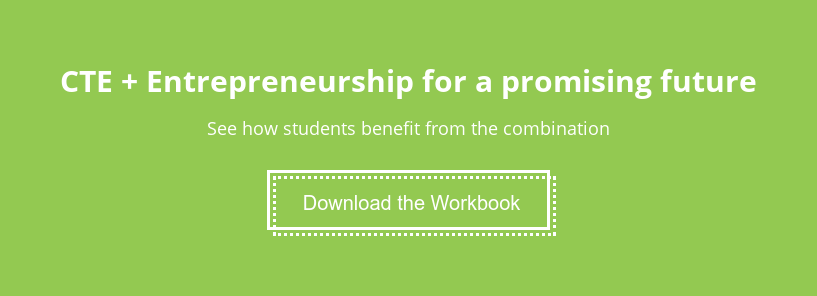Our most recent webinar: 'Learning with a Purpose: Entrepreneurship, CTE, and the Evolving World of Work, featured leading Florida educators and leaders as they discussed how critical 'human skills' are more important than ever for enabling students to thrive in the ever-evolving world of work. We spotlight parts of that discussion here:

"We identified entrepreneurship as a key priority."
~ Dr. Henry Mack, Chancellor for Career, Technical and Adult Education at the Florida Department of Education
The most desirous skills, at least in terms of the future of work, by 2030 will be human skills like mental agility, flexibility, risk propensity, the ability to create value and communicate strong analytical and systems thinking.In the Florida Perkins V state plan, we specifically speak about cultivation of human skills, and how CTE programs can be a mechanism for not only economic stabilization but growth. And if we're going to talk about growth, we have to understand the future of work, the impact of automation, the impact of technology and disruption, and how to help students cope or enter industry, and knowing how to pivot and deal with that.
...the best way to do that is entrepreneurship education and training that engages students. You witness higher persistence rates, you witness higher completion rates to get them into their program of study. But while you do that, you are also cultivating these human skills like mental agility and risk propensity, flexibility, and value creation and ideation.
So in Perkins V, we identified entrepreneurship as a great, key priority.
Entrepreneurship really provides a nice opportunity or route to cultivate those virtues. So again, we're not just graduating technically-trained employees, but employees that can truly add value. So it's really a new way of thinking, I would submit, around workforce education and CTE classes, at least in Florida, because of the kind of marriage that we're looking to make between these human skills and technical skills and entrepreneurship education training.
We are trying to figure out ways to embed entrepreneurship-related competencies across degree programs, so that if you're majoring in health sciences, or engineering, tech or advanced manufacturing, or construction or whatever, you're still walking away with entrepreneurship-related competencies, skills and knowledge.
And...it's interesting to see how education can partner with local workforce development to achieve the same shared aims...
"...the skills gaps employers were seeing are these human skills."
~ Dan McGrew, Vice President of Strategic Policy and Performance for CareerSource Florida
We commissioned a study back in 2018 to study skills gaps. By and large, the primary skills gaps employers were seeing are these human skills. You may have heard of them as soft skills or resilience skills, and they've been called a lot of different things over the years. But these human skills of communication, leadership, teamwork, creativity, initiative...these skills are across the board skills that employers are looking for.
Entrepreneurship and starting businesses can be a major economic engine, but these skills are transferable across the board.
Anytime you're bringing value to an employer, whether it is your technical acumen that you're bringing to the table, or these very human skills that we're talking about today, entrepreneurism is bringing value to an employer, and it increases retention and increases career advancement, which increases wages and long-term sustainability.
Furthermore, in a gig economy—which with COVID there's a lot more of that going on right now—and having to be resilient and flexible, people's income is extremely diversified. That's entrepreneurism at the micro level, like how that person is navigating that world and creating an income and finding and seeking opportunity and adjusting those opportunities as the need changes. These are the skills we're talking about. And they are so important for success in life.
And, going back to one of the key concepts that I love from Uncharted Learning’s white paper: "Learning with a Purpose”... when you can find that purpose and find that career path, whether it's starting your own business or pursuing an area of interest, that's when you can get the engagement. And that's when you can get the advancement.
.jpg?width=200&name=falia-justima%20(2).jpg)
"Entrepreneurship in my classroom ... it's really the ability for the kids to make connections."
~ Falia Justima, INCubatoredu entrepreneurship teacher at Immokalee High School
I didn't know such opportunities existed at the high school level. So when I became a teacher with Collier County, I realized that those opportunities do exist with students in high school and it was shocking to me that kids could learn the things that they're learning in the classroom.
So with entrepreneurship, it's really the ability for the kids to make those connections that they don't have at home. And for many of them, this is the first time they're being exposed to this entrepreneurship concept.
So having this course really provides not only opportunities for them to move forward academically, but also opportunities for them to look beyond high school.
I want to point something out. For me, it's really that notion of diversity in the classroom. They get to see people like themselves in the community who while successful, have probably failed before, and now they have an opportunity to see what that looks like in the real world. So it's really making those connections in the classroom at that level, before they get to leave high school.
We also have opportunities to bring mentors into the class. They talk to the students about their own experiences, what it's like to run a company, what it's like to fail at your first business, and they get to hear it first-hand from the mentors. And I tell you, they care for our students, they spend time with them. They listen to them, they are consistent.
We can increase the diversity in the classroom, where they get to see anf interact with people like themselves, people who look like them, people who come from the same background, who are successful, who are entrepreneurs.So you start out with students who have difficulties for example, even shaking hands or looking at you in the eye or saying their names with confidence. And then by the time we get to pitch day, you get those students standing up in front of their communities, making a presentation. It's just amazing to see the growth. They realize they have specific skills that they can actually push, and actually make a business and make a living out of it. So for them, it's really very personal, because it's their idea, it's their experience, and they see what's possible.
"Everything that they're learning in entrepreneurship are skills for life..."
~Dr. Kamela Patton, Superintendent at Collier County Public Schools
Everything that they're learning in entrepreneurship are skills for life: collaboration skills, team building, communication skills, project management, and financial and networking skills. All of those are so important.
Just yesterday, I had that chance to walk in to see a brand new teacher teaching this entrepreneur course (mxINCedu). These were middle school students who usually don’t speak. But not in this class. Their hands were up.
I had a great conversation with them. When I asked them how they enjoyed it, every single kid started with the words, "This class is fun." Then I asked them what some of the new terms were that they’d learned. A girl shot her hand up and said, “Well, our team already pivoted because our product was not viable. So we're already on our second product.” I replied, “Listen to what you just said! Do you realize you are only four weeks and two days into school?”
Look at what this kind of education does to engage kids, to understand businesses. Nobody can say, "Well, these kids can't do it." It's when you give kids opportunity, they will rise.
It's trying to create equity. We're trying to offer these programs in every single high school and every single middle school. If we can do it, anybody can do it. So we're thrilled to be on this journey.
Come down and visit, come down and visit a high school or middle school — we will get you through both, because you leave so charged up that you're ready to go!
.jpg?width=221&name=dan%20mcgrew%20(2).jpg)
.jpg?width=196&name=KamelaPatton%20(2).jpg)
